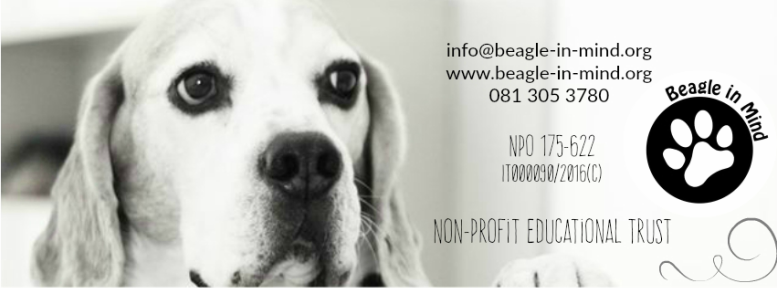 Photo: ShutterMutts Pet Photography Photo: ShutterMutts Pet Photography As an educational trust our main mission since inception has been to assist and support owners so we can avoid seeing Beagles enter the rescue system through misunderstood perceived behavioural "problems". Through our journey it became clear that we cannot completely separate ourselves from the world that is rescue. We had tried to distance ourselves to some degree as we're simply unable to do what the "Rescue big wigs" do and couldn't take on what the volunteers that start up smaller orgs do. We had had some experience in observing quite a lot of politics within the NPO/Welfare/Rescue community which was another reason why we made the decision to be an educational trust with the hope of working alongside and behind orgs rather than be "yet another" animal welfare organisation. By aligning ourselves with one organisation the goal is to create awareness that we are here to work with any organisation to assist with the successful rehoming of Beagles or here to be a point of contact for owners and fosters that have questions. It is also a way of "getting our foot in the door" to make other organisations that rehome Beagles aware of what we do. We understand that Rescue Organisations have a full time job in just processing adoption applications, surrender forms, organising foster carers, vet visits, doing home checks, checking fosters have enough food and so forth that to still be on hand to answer questions, assist with behavioural issues and so forth makes it an almost impossible task. As Beagle in Mind this is where our intent is to pick up that slack. To get to the point of this series of posts: In the last months we have found ourselves ever more immersed in the world of Rescue Organisations. We have our own opinions that have formed and we try not to let this influence when we answer people's questions about the rescue process. Not only does each organisation have their own process and way of doing things - sometimes organised, sometimes not. - each situation with each different animal can change "exact protocol" at the drop of a hat. In other words - rescue is simply not an exact science. We have however come to realise that this (understanding "Rescue") also needs to form part of our educational mission. We have been experiencing many people contacting us confused, frustrated, sad, angry, feeling misled (to name a few) due to their dealings with rescue organisations. We would like to share with you in a few blog posts what we have generally experienced either ourselves or through the communication with people considering adoption or surrendering their hounds or chatting with people that work for and even head up animal welfare and rescue organisation. Please understand that these posts are not targeted at anyone or any organisation in specific. It is a tough "business" - the world of rescue - and it is impossible to keep everyone happy all of the time. We would like to give some tips to those out there wanting to adopt, those wanting to surrender as well as a few suggestions to recue organisations to keep in mind. Not everyone will agree, like I said, each org has its own way of doing this. These posts are intended to provide "food for thought". Whether it be for people running orgs to be reminded of things they once knew but forgot (as one gets so swept up in the "monster" that is animal rescue) or people out there wanting to adopt, have gotten frustrated in trying to adopt or have just gotten generally confused. We hope that everyone can read this series with an open heart and an open mind. If offense is taken, this is not our intention. All we want is for all parties concerned in the rescue process to step back and understand that there are other aspects to the process than what you see when you are busy with your part of the process - rescuing, adopting, fostering, surrendering. If you find any of what we say helpful or insightful please do share. It will find those meant to read it. We would love to hear your thoughts on anything. We learn from everyone's insights and so can others. If you would like to be notified of the other parts of this blog series please pop us an e-mail: [email protected], Subject: The World of Rescue Blog series update request Next: The World of Rescue Part 1: The reason we need to ask Why?
2 Comments
4/9/2019 05:00:54 am
I am thrilled that I found this article! You have really made your points clear and your material is easy to read because you have formatted it so well.ou have obviously done a lot of work on this. Your writing style makes this interesting.
Reply
Leave a Reply. |
ALTERNATIVE HEALING & BLOG DISCLAIMER
Alternative healing articles and any other advice featured in this blog do not claim to replace any conventional veterinary treatment. This is an educational blog for Beagle owners to read about alternative options that we as Beagle owners have tried ourselves and seen positive outcomes. We do not post anything we have not experienced positively and will never endorse anything in which we do not believe through positive experience. Kinesiology and other healing modalities do not diagnose, cure or prescribe, as these activities are the prerogative of veterinarians. Kinesiology may provide a different, energy-based approach to allergy support, and potentially allow for a reduction in the use of corticosteroids. As a kinesiologist, I believe that allergies, just like other ailments, may have an emotional and/or mental aspect which is worth addressing. As such, this modality represents a valid complementary therapy to veterinary care. Categories
All
|
Proudly powered by Weebly





 RSS Feed
RSS Feed